Oil, chaos, and the sacred guest: two weeks in Iraqi Kurdistan


· 15 min read
It is just past nightfall on a hot Saturday in July when I finally arrive in Iraqi Kurdistan after six long hours of heat, hunger, and barely controlled chaos at Ibrahim Khalil border crossing. I check the time on my phone: it is 8.30pm, an hour after the bus was scheduled to arrive in Erbil, the lively capital of Iraqi Kurdistan, where I had planned to meet some Couchsurfers for Saturday night beers. I check the map: we are still three hours drive away and are about to stop for the obligatory one-hour dinner break. My dreams of cold beer slowly evaporate in the hot night air.
I have crossed my share of land borders in my time and had been careful to account for some delays in making my evening plans. Crossing by bus requires every passenger to get off and go through passport control in both countries, and often takes a full hour or sometimes two. But I was entirely unprepared for the madness that was Ibrahim Khalil. Our bus stands still for hours at a time, slowly moving forward only to later be told to reverse in what feels like a real-life game of Snakes & Ladders. Outside my window the waiting drivers and passengers occasionally engage in brief, heated debate about how to proceed before giving up and going back to sitting on ledges and waiting it out. When we finally make it into the passport control office, my brief illusion of separate lines for each counter soon dissipates as they merge together and the men (for they are, with very few exceptions, all men) shuffle back and forth like cars trying to beat the traffic by changing lanes.
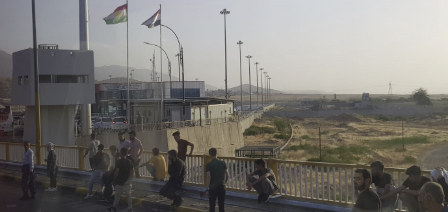
In hindsight, though, I probably should have been more prepared for the chaos. Nestled between the town of Silopi in Turkey’s South-east and Zakho in Iraq’s North-east (and only a hop, skip, and a jump from the Syrian border) Ibrahim Khalil is the only crossing point between the two countries. On both sides of the border sit regions dominated by Kurds, the world’s largest group of stateless people (aside from Iraq and Turkey, there are also millions in Iran and Syria). This makes the border crossing equal parts popular and complicated. Popular, because many Turkish and Iraqi Kurds have jobs, friends, and relatives on the other side of the border. Complicated, because both Iraqi and Turkish Kurds want independence from their respective nation states and are more than willing to use force to achieve it.
The Iraqi Kurds have so far had the most success in this regard. While they remain part of Iraq, they enjoy an impressive degree of autonomy. In fact, when you cross Ibrahim Khalil border you are, in a very real sense, not really entering Iraq proper. There are no Iraqi soldiers, customs officers, or border guards in sight and the visa on arrival I am issued does not entitle me to go to Baghdad, Basra, or Mosul. The border is controlled by the regional government of Iraqi Kurdistan and its Peshmarga armed forces, who have built an impressive reputation fighting the Iraqi army and, more recently Daesh/ISIS. Their rugged, battle-hardened demeanour makes them fiercely respected — it only takes one to control a crowd of dozens of impatient drivers and pedestrians frustrated with long hours of waiting at the border — while also sharply contrasting with the tidily-dressed and clean-shaven border guards that apply exit stamps to our passports on the Turkish side.
As the only Kurdish region with significant autonomy, Iraqi Kurdistan has become a haven for the guerrilla fighters (or terrorists, depending on who you ask) of the Kurdistan Workers’ Party (or PKK), who are fighting for the autonomy of Turkish Kurds. Not being one to let a pesky border get in the way of its imperial adventures, the Turkish army regularly bombs targets within Iraqi Kurdistan [One evening, some people I met were on a camping trip in the mountains and hear explosions nearby, motivating them to quickly relocate to a nearby hotel.] Suffice to say that all this does not make for cosy relations between Turkey and Iraqi Kurds, and on each side of the border there are long queues as guards thoroughly check who and what they are letting in and out (later, on the way back, I encounter towering piles of cigarettes confiscated from enterprising individuals seeking to earn some margins on the Turkey-Iraq tobacco price differential).
As we eventually leave the border behind and head toward Erbil, I get the overwhelming sense we have entered oil country. The road is lined with petrol station after petrol station, each emblazoned with its own mix of bright lights and vibrant colours. While back in Europe you can travel for tens of kilometres without finding a place to fill your tank and will inevitably find yourself in a station run by one of the half dozen major retailers, here there are stations almost every hundred meters and dozens of different companies. Oil is abundant and opening up your own station is almost as easy as opening a lemonade stand. Even the air smells pregnant with the thick, pungent cocktail of freshly filled tanks and the fumes of hundreds of pick-up trucks mixed with those from nearby oil refineries.
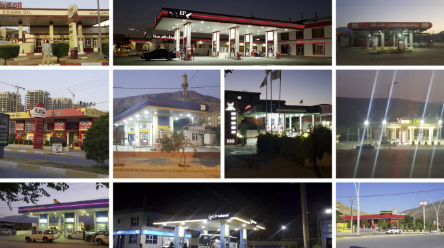
As I arrive in Erbil and begin to meet locals, oil never seems far from the conversation, either. While for visitors, prices are dirt cheap, at around half the cost we pay back home, locals complain that the price has skyrocketed in recent years. Driving around Erbil, my new Couchsurfing friend and self-appointed local guide, Zoran, carefully inspects the prices at every petrol station we pass and takes note for future reference. My AirBnB host is an oil engineer and keeps every penny of his salary, the government being too flush in oil revenues to bother with levying income tax. When I suggest that the age of oil is in its final stages as the world belatedly responds to the rapidly accelerating climate emergency, he is sceptical. “That may be the case in Europe,” he responds with a wry smile. “But here we will be burning oil for a long time to come.”
While I feel my host’s outlook under appreciates the emerging sense of urgency that is pushing even the most recalcitrant petrostates to edge toward clean energy, the more time I spend in Iraqi Kurdistan the less surprised I am at this viewpoint. Buses and trains are all-but-absent and, while the haphazard network of minibuses and shared taxis provides works reasonably well, it is private cars that really rule the roads. The bigger, the better, too. If the car is king, the pick-up truck is the high king. In cities as in mountain villages, Iraqi tourists and local Kurds alike proudly parade in these monster gas guzzlers, their arms casually resting out the window as they overtake lesser vehicles on hard shoulders and sharp bends, all the while lighting cigarettes and animatedly speaking into their phones.
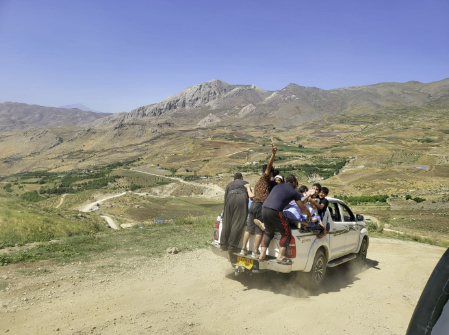
I soon learn that, rather than being needed for carrying heavy luggage, pick-ups are really just efficient ways to carry large Iraqi families. Walking alone on a mountain road, a large pick-up truck coming my way has almost a dozen pint-sized passengers standing up on the back, leaning to one side as they grab the railings. For a brief moment this reminds me of images of child soldiers on the back of military trucks I have seen in films and, remembering where I am, experience a brief jolt of fear. But as the truck approaches, I see the passengers are just excited children smiling and laughing without a care in the world (or any apparent sense of mortality).
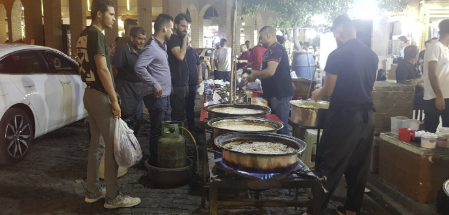
In Turkey it was hot, probably even hot enough to fry and egg on the footpath. Here, however, I feel like we are getting closer to ‘leave your water outside to boil’ temperatures. During the afternoon (and I define that period very, very broadly), it is nigh on impossible to do anything that cannot be done indoors, ideally in an air-conditioned room or, at a minimum, in front of a fan spinning at full speed. In Erbil, the effects of the searing temperatures are compounded by the thick layer of vehicle fumes that hovers in their air, the hot tarmac, and the relative absence of trees or other natural forms of shade. On my first day, determined to explore the city while there is still light, Zoran and I spend half an hour walking around the citadel and bazaar at 5am before admitting defeat to the heat, sweatily retreating and completing the tour from the comfort of his air-conditioned car.
Immobilized daily by the daytime heat, it is after nightfall that locals emerge from their high-rise caves and bring the city alive. Plans to meet for dinner, drinks, or nargile (shisha) are rarely made for before 10pm and even on weekdays I see couples and groups sitting down for a cosy dinner well past midnight. It’s a family affair, too. Enjoying some Sunday night beers on a terrace frequented mostly by government workers [I am later told they eat and drink there on the cheap in a surprising case of a Muslim government subsidizing alcohol], I have to blink when, heading inside to the toilet, I see a play area overrun by excited children taking full advantage of their momentary lack of supervision.
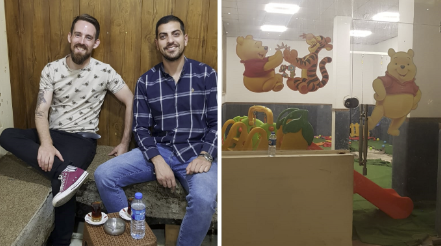
Later, as I return to my AirBnB at 2am, I see small girls playing on scooters in the square of the apartment block, as if they had just been let out of school. Feeling vaguely like I have found myself in some strange, parallel universe, I shake my head and take the lift up to my flat, quietly opening the door and tiptoeing inside so as not to wake my hosts. Of course, this turns out to be pointless: they were all still awake.
In Turkey, Daniela and I had experienced great hospitality in the less-touristic city of Urfa but, once we arrived in the more popular destination of Mardin, we soon began to notice our reflections in the pupils of local business owners we encountered closely resembled dollar signs. Many eateries did not have menus and simply served what they had, which seemed charming until we asked for the bill and were presented with quizzically large (and round) numbers that seemed fancifully plucked from the air. All too often, this left a bitter aftertaste in an otherwise lovely cultural (and culinary) experience.
Arriving in Iraqi Kurdistan, I soon realise that my main concern is not being overcharged but not being charged at all. Once I leave Erbil, I regularly find myself having to insist on shopkeepers accepting my money, often to no avail. In some cases, I suspect they simply have no idea what to charge me for the bafflingly small volumes I am trying to buy (I quickly become used to seeing the question ‘what kind of psychopath buys a single piece of fruit?’ written on greengrocers’ faces). In most cases, however, they are simply showcasing the exceptional hospitality Kurds are rightly known for.
While in other countries extraordinary acts of hospitality often happen once or twice during a trip and really stand out, in Kurdistan they are basically the norm. Everywhere I go, people ask where I am from and offer me their contact details, instructing me to get in touch if I need anything at all. Walking down the street in Soran, I approach a man in a small shop with a large teapot standing outside asking if I can have a cup of tea, and before I realise he is actually an estate agent he has sat me down and gone to the tea shop next door to buy one for me. Lost in Choman, a group of teenage boys leads me to the only hotel in town, where another group invites me inside the local cultural centre to wait while the hotel owner returns from some errands. Hitchhiking in Nawprdan, a local man and his son stop and take me to a beautiful mountain resort, and later invite me to their home for dinner and give me a lift back to my guesthouse. In Rawanduz, a local guy I meet on the minibus offers to show me around and ends up dedicating a full day to making me welcome (more on that in a forthcoming blog post). Even the local Peshmerga stops me for a chat when I am out hitchhiking and tells me he would love to loan me his motorbike if he did not need it for, you know, Peshmerga business.
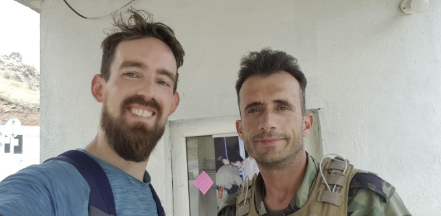
Even in Erbil, I am treated to hospitality I did not think possible in such a big, busy city. Searching for a tour to the mountains, I contact the lovely Arazu of Kurdistan Outdoor, who informs me they don’t have any tours in the coming days but anyway invites me to come take photos and drink tea with her by the citadel. She then introduces me to her friend Khazan, who takes me for falafel and introduces me to oasis that is Sami Abdulraham Park, the only place in the city where temperatures are bearable before 10pm. And Zoran goes above and beyond even the high Couchsurfing standard, always collecting me and dropping me off when we meet and ferrying me around town to get case and buy SIM cards.
The hospitality is such that is often takes me by surprise. This can lead to some awkward situations, like when I have been hiking in the midday heat, seating half my body weight out in my shorts and sports shirt, only to be invited for dinner in a family home and having neither a change of clothes nor any real option to refuse. Or when the teenage boys who had helped my find the hotel, decide that I am one of their group and keep messaging me on Facebook. And several times I am left speechless as random men I have just met tell me they love me (I eventually decide to chalk that one up to mistranslation, for my own peace of mind if nothing else).
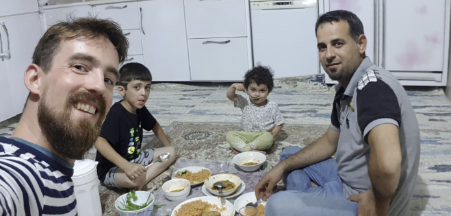
This kind of hospitality also makes me very quickly feel like a kind of quasi-local. Within a few days of arriving, I had made more local friends that in my entire time in Turkey, all of whom are regularly messaging me to ask how I am doing and asking if I want to meet up. When staying in the small mountain town of Choman, I am introduced to a young man who tells me he already had heard about me from his friends, who I had met the day before. And walking into a café in Erbil, I run into a man I had met on the bus from Turkey several days before.
During my time in Kurdistan, locals rejoice in telling me that the region is both the safest and the most developed in Iraq. And they are right. The Peshmerga keep the region’s borders secure, tightly controlling entries both from other countries and from Federal Iraq, and both terrorist attacks and petty crime are exceedingly rare compared to the rest of the country. This has allowed investment to flourish, and some say Erbil would be close to becoming the next Dubai if so much money had not been spent fighting back Daesh in recent years.
Despite this relative prosperity, this is still Iraq, and for many, life is hard. I see it in faces that look older than mine despite having spent fewer years on this earth, and hear it from the mounts from those I meet. Sitting one day in Choman Cultural Centre drinking tea and eating fig-filled biscuits with the locals, a man around my age asks how many countries I have been too. I quickly do some rough calculations in my head and proudly reply that I have been to around 60. But rather than being impressed, he appears sad. “I have only been to Iran” he tells me. “Nobody else wants to allow Iraqis in.”
Many others I meet tell a similar story of travelling only to Iran or not at all. Iraqis can only travel visa free to six countries and can get visa-on-arrival in another 18. For the vast majority of countries, they must go through cumbersome visa processes, or cannot enter at all. And that is just if they want to go on holidays. Many people I meet long to emigrate but see it as out of reach due to economic and bureaucratic hurdles. They lament that the world sees them as dangerous and only associates the country with war. “But there is no war here, look!” I am told. And they are right. The entire time I am here the only time I feel unsafe is a situation entirely of my own making (more on that in my next blog post).
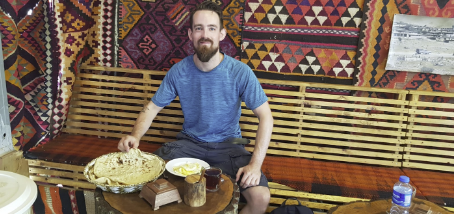
Travelling here I am reminded of how fortunate I am to, by accident of birth, be blessed with a good passport and the means to travel the world. That I have only ever been refused one visa in my life (by Iran, ironically), is a testament to the privilege afforded by my nationality and economic background. And my initial disbelief when I learned it had been refused shows how much I take being able to travel where I like for granted.
And so, dear reader, if you take one thing from this blog, it should be that Iraq is so much more than war and terror, that Iraqis and Iraqi Kurds are among the kindest, most generous, and hospitable people on the planet, and that no people should be judged by the acts of its despots. If you work in a foreign ministry, how about reconsidering those entry requirements. And if you are planning a holiday, I cannot think of a richer experience than visiting Iraqi Kurdistan.
Just remember to bring a change of clothes when you go hiking.
Future Thought Leaders is a democratic space presenting the thoughts and opinions of rising Sustainability & Energy writers, their opinions do not necessarily represent those of illuminem. This article was also published on Medium.
illuminem briefings

Hydrogen · Energy
illuminem briefings

Energy Transition · Energy Management & Efficiency
Vincent Ruinet

Power Grid · Power & Utilities
World Economic Forum

Renewables · Energy
Financial Times

Energy Sources · Energy Management & Efficiency
Hydrogen Council

Hydrogen · Corporate Governance